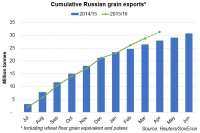

Brenda Mullan, Acting Senior Analyst, AHDB Market Intelligence
Brenda.mullan@ahdb.org.uk, 02476 478862
Russian grain exports outstrip last year's record
According to the latest projections from Russian agriculture consultant's SovEcon, April's grain exports are set to reach a record 2.5Mt. On a season-to-date basis, Russian grain exports have already overtaken last year's record, aided by a favourable exchange rate (see below). Exports since February (including April's activity, if realised) see cumulative exports stretching further upwards from last year's level, with full season exports expected to hit 31.4Mt (30.8Mt in 2014/15).
SovEcon estimate that wheat exports in April will reach 1.6Mt, over 1Mt more than last April. Egypt has been Russia's key destination for wheat exports this season, with the country having procured 5.3Mt of the grain between July 2015 and March 2016.
Wheat exports from the Black Sea Region have been competitive enough to fight off supplies from other key exporting regions this season, such as the EU and US. This is further demonstrated by EU and US wheat export progress to date, lagging last year's levels by 7% and 17% respectively. With UK exports both directly and indirectly impacted by EU trade progress, if the EU struggles to compete with Black Sea supplies, this could also be problematic for the UK.
Keep an eye out on the AHDB Cereals & Oilseeds Markets webpage in May for an update on Russian crop development and spring plantings by SovEcon, which will provide an insight as to how 2016/17 is shaping up.
Fig 1
Weaker ruble helps boost exports
In today's MI Prospects article, Millie Askew talks through some of the factors affecting UK wheat and barley export progress this season. Included in that and touched on above, is the strength of domestic currency. Typically, a stronger currency relates to less competitive exports because it costs more, in terms of foreign currency, to buy the same volume of goods (everything else remaining the same).
Compared with last year, the Russian ruble has stayed at relatively weak rates compared to both the euro and the US dollar, helping to boost Russian export sales. If currency trends continue as they have this season, this could mean further pressure on European and American supplies to secure export demand. From a UK perspective, the upturn in the strength of the pound in recent weeks will make it even harder to compete with cheap Black Sea grains.
28.04.2016, 2997 просмотров.